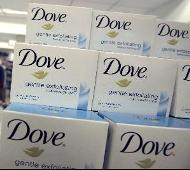 India's largest soap maker has implemented technology that resulted in significant carbon dioxide reduction in its manufacturing process.
India's largest soap maker has implemented technology that resulted in significant carbon dioxide reduction in its manufacturing process.
At the grand global policy-making level, the Indian government is heatedly arguing with the developed world over its share of stringent new carbon emission reductions.
At the corporate level, however, a growing number of companies are beginning to understand the sheer economic advantages of 'going green' in a world of rapidly depleting resources, whatever the outcome of climate talks.
Many, therefore, have started research on real, viable changes on the assembly line that could translate into solid reductions in emission and raw material and, therefore, significant savings or earnings.
For instance, a single process change by India's largest soap maker Hindustan Lever earned the company 15,000 carbon emission reduction points over the last three years (it earns 15,000 CERs a year).
To put this in perspective, a company gets 1 CER point for the reduction of 1 tonne of carbon dioxide (Co2) under the United Nations CER programme.
If the CER is traded on the global carbon trading market, the makers of Lifebuoy, Lux and Hamam could potentially earn at least $150,000 (approximately Rs 75 lakh) from one process change alone since one CER trades at upwards of $10.
HUL is the first soap manufacturer to go green in its manufacturing process. Developed in collaboration with the Anglo-Dutch parent, HUL introduced technology called the Plough Share Mixer to make soap 'noodles' that eliminated steam consumption required by the traditional production method known as the Bran and Luebbe Supraton-Mazzoni process. Soap noodles refer to the long line of solid soap bars before they are cut to the requisite size.
"India is one of Unilever's largest soap manufacturing centres. As we move towards environment consciousness we decided to look at processes where we could use less water and less energy," said Dhaval Buch, executive director (supply chain), HUL, on the decision to develop the PSM technology in India.
Over the last three years, PSM technology has been rolled out across all HUL's eight manufacturing plants in India leading to an annual reduction of 15,000 tonnes in its Co2 footprint.
The move was part of HUL's Green House Gas reduction programme between 2004 and 2008 which has achieved a 25 per cent reduction in Co2 emissions in manufacturing by following a strategy based on the 5-R Principle -- Reduce, Reuse, Recycle, Recover and Renew.
Explaining the difference between the old technology and the new, Buch said, "The old process was a multi-steps one that used steam generation from fossil fuels like high-speed diesel or coal to convert liquid soap into solid noodle bars."
PSM is single equipment performing three roles of a mixer, reaction vessel and drier- it looks rather like a giant drum -- that reduces the heating and cooling losses resulting in a final product with 15 per cent less moisture.
The importance of this small change can be gauged from the fact that soap bars are among the highest penetrated fast moving consumer goods in India and HUL is a market leader by a long margin.
As of December 2008, the FMCG major has a volume market share of a little over 45 per cent in the 5,50,000 tonne soap market. In value terms, the company's products account for close to 46.3 per cent (April to June 2009).
PSM technology has made HUL proud but sector experts monitoring Co2 reduction initiatives in the country are less than impressed. According to the project report the activity has eliminated steam consumption but increased the power consumption in soap noodle manufacturing process.
"We need to look at soap manufacturing as a whole and at the raw materials used. We then need information on the overall carbon footprint for the entire soap manufacturing operation to determine the percentage reduction this 15,000 CER amounts to," says Chandra Bhushan, associate director at Centre for Science and Environment.
He pointed out that companies often reduced their carbon reduction in one process and increasing it another process in the supply chain.
Prabhat Uphadyay, research associate with The Energy and Resource Institute echoes Bhushan's views for more transparency. "To ascertain the impact and sustainability of the initiative, the company needs to be more transparent and share the entire soap manufacturing process details. Companies should voluntarily declare their carbon footprint," he said.
Measuring the entire carbon footprint across a manufacturing process, however, involves huge complexities besides entailing huge costs.
Besides, there is no standard procedure to measure this yet. But overall, this small step by HUL could mark one of the giant leaps for Indian manufacturing.







 © 2025
© 2025